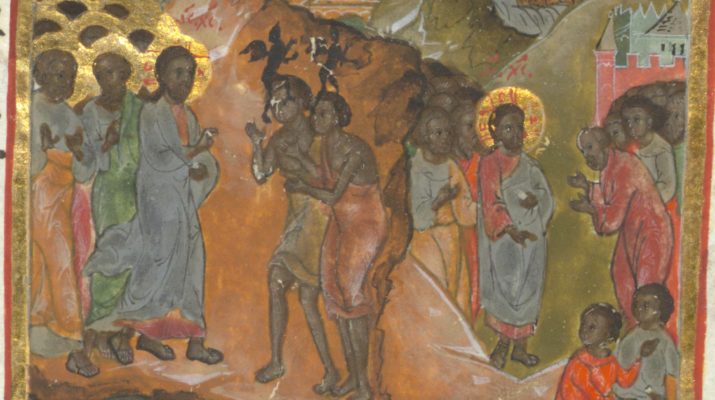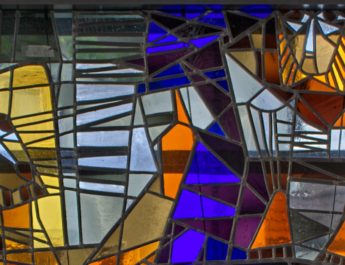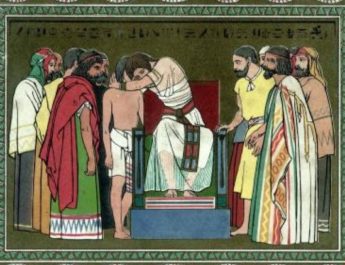Mark 5:1-20
NL 222
1 They cameI to the other side of the sea,II to the countryIII of the Gerasenes.IV
I “came” = erchomai. This is to come or go.
II “sea” = thalassa. Perhaps from hals (sea, salt, a boy of saltwater) or halas (salt; can be figurative for prudence). This is the sea, a lake, or seashore.
III “country” = chora. From chasma (gap, gulf, chasm, open space); from chasko (to gape, yawn). This is space, land, region, fields, open area – the countryside in contrast to the town.
IV “Gerasenes” = Gerasenos. 3x in NT. Perhaps from Hebrew Girgashi (Girgashite; one of the tribes of Canaan) OR perhaps from Akkadian (clay or cod) OR related to Arabic (black mud) OR related to Hebrew garar (to drag out). This is Gerasene, a city whose name means “people who dwell in a place of clay soil or black mud.” Seehttps://www.abarim-publications.com/Meaning/Girgashite.html#.X1Ztw8hKhPY
2 And when he had steppedV out of the boat,VI immediatelyVII a manVIII
V “stepped” = exerchomai. Related to “came” in v1. From ek (from, from out of) + erchomai (see note I above). This is to go out, depart, escape, proceed from, spread news abroad.
VI “boat” = ploion. From pleo (to sail, voyage); probably from pluno (to plunge – so to wash); from pluo (to flow). This is a boat, ship, or vessel.
VII “immediately” = eutheos. From euthus (immediately, upright, straight and not crooked); {perhaps from eu (good, well, well done, rightly) + tithemi (to place, lay, set, establish)}. This is directly, soon, at once.
VIII “man” = anthropos. Probably from aner (man, male, husband) + ops (eye, face); {from optanomai (to appear, be seen); perhaps from horao (become, seem, appear)}. This is human, humankind. Used for all genders.
out of the tombsIX with an uncleanX spiritXI metXII him.
IX “tombs” = mnemeion. From mousikos (to remember); from mneme (memory or mention); from mnaomai (to remember; by implication give reward or consequence); perhaps from meno (to stay, abide, wait, endure). This is properly a memorial – a tomb, grave, monument.
X “unclean” = akathartos. From a (not, without) + kathairo (to cleanse or purify by purging out unwanted elements); {from katharos (clean, clear, pure, unstained; clean in a literal, ritual, or spiritual sense; so, also guiltless, innocent or upright; something that is pure because it has been separated from the negative substance or aspect; spiritually clean because of God’s act of purifying)}. This is unclean or impure, whether a thing or a person. It is something that is not mixed with something that would taint. This is unclean in a ritual or moral sense. It can also mean demonic or foul.
XI “spirit” = pneuma. From pneo (to blow, breath, breathe hard). This is wind, breath, or ghost. A breeze or a blast or air, a breath. Figuratively used for a spirit, the human soul or part of us that is rational. It is also used supernaturally for angels, demons, God, and the Holy Spirit. This is where pneumonia comes from.
XII “met” = hupantao. 10x in NT. From hupo (by, under, about, subordinate to) + antao (to meet with personally) OR from hupo (see above) + anti (opposite, instead of, against). This is to encounter someone or to go to meet them.
3 He livedXIII among the tombs;XIV and no one couldXV restrainXVI him any more, even with a chain;XVII
XIII “lived” = katoikesis + echo. Katokesis is 1x in NT. From katoikeo (to live or settle on a permanent basis); {from kata (down, against, throughout, among) + oikeo (to settle or be established somewhere in a permanent way, to make a home or live at home); {from oikos (house – the building, the household, the family, descendants; the temple)}}. This is dwelling or habitation. Echo is to have, hold, or possess.
XIV “tombs” = mnema. Related to “tombs” in v2. 8x in NT. From mnaomai (see note IX above). This is memorial, tomb, or monument.
XV “could” = dunamai. This is to be able, or something that is possible. It can also be empowered or being powerful. The Greek word for “miracle” (dunamis) comes from this root.
XVI “restrain” = deo. To tie, bind, compel, put in chains. This is to bind in a literal or figurative sense. Can also mean declaring something unlawful.
XVII “chain” = halusis. 11x in NT. This is a chain or fetter.
4 for he had oftenXVIII been restrained with shacklesXIX and chains, but the chains he wrenched apart,XX and the shackles he broke in pieces;XXI and no one had the strengthXXII to subdueXXIII him.
XVIII “often” = pollakis. 18x in NT. From polus (much, many, abundant). This is often, many, frequently, again and again.
XIX “shackles” = pede. 3x in NT. From peza (instep); from pous (foot in a literal or figurative sense). This is a shackle – specifically for feet.
XX “wrenched apart” = diaspao. 2x in NT. From dia (through, because of, across, thoroughly) + spao (to pull, to draw a sword). This is to tear apart, sever, burst.
XXI “broke in pieces” = suntribo. 8x in NT. From sun (with, together with) + the same as tribos (worn track or path like a rut that is formed from rubbing i.e. steady use; also road or highway); {from tribo (to rub or thresh)}. This is break in pieces, bruise, shatter, or crush completely.
XXII “had the strength” = ischuo. From ischus (strength, might, power, force, ability; power that engages immediate resistance). This is to be strong or have power. It can also refer to being healthy and vigorous. Further, it can mean to prevail. It is strength in action against resistance, exercising force in a literal or figurative sense.
XXIII “subdue” = damazo. 4x in NT. This is to tame or subdue.
5 Night and dayXXIV among the tombsXXV and on the mountainsXXVI he was alwaysXXVII howlingXXVIII and bruisingXXIX himself with stones.XXX
XXIV “day” = hemera. Perhaps from hemai (to sit). This is day, time, or daybreak.
XXV “tombs” = mnema. Same as “tombs” in v3. See note XIV above.
XXVI “mountains” = oros. Perhaps from oro (to rise); perhaps akin to airo (raise, take up, lift, remove). This is mountain or hill.
XXVII “always” = pas. This is all or every.
XXVIII “howling” = krazo. This is to cry out, scream, shriek. It is onomatopoeia for the sound of a raven’s call. Figuratively, this means crying out urgently without intelligible words to express something that is deeply felt.
XXIX “bruising” = katakopto. 1x in NT. From kata (down, against, throughout, among) + kopto (to cut, strike, cut off; beating the chest to lament and so to mourn). This is to cp down, mangle, wound.
XXX “stones” = lithos. This is stone in a literal or figurative sense.
6 When he sawXXXI JesusXXXII from a distance, he ranXXXIII and bowed downXXXIV before him;
XXXI “saw” = horao. Related to “man” in v2. See note VIII above.
XXXII “Jesus” = Iesous. From Hebrew Yehoshua (Joshua, the Lord is salvation); {from YHVH (proper name of the God of Israel; the self-existent and eternal one); {from havah (to become) or from hayah (to come to pass, become, be)} + yasha (to deliver, defend, help, preserve, rescue; properly, to be open, wide or free, which implies being safe. So, in a causative sense, this is to free someone)}. This is Jesus or Joshua in Greek – the Lord saves or the Lord is salvation.
XXXIII “ran” = trecho. 20x in NT. To run, make progress, rush. This is running like an athlete in a race. Figuratively, to work quickly towards a goal in a focused way.
XXXIV “bowed down” = proskuneo. From pros (advantageous for, at, to, toward, with) + kuneo (to kiss); {may be related to kuno (dog)}. This is to do reverence, kneel, to prostrate oneself in homage, to worship.
7 and he shoutedXXXV at the topXXXVI of his voice,XXXVII, XXXVIII
XXXV “shouted” = krazo. Same as “howling” in v5. See note XXVIII above.
XXXVI “top” = megas. This is big in a literal or figurative sense – great, large, exceeding, abundant, high, mighty, perfect, strong, etc.
XXXVII “voice” = phone. Probably from phemi (to declare, say, use contrasts in speaking to shed light on one point of view); {from phao (to shine) or phaino (to bring light, cause to appear, shine, become visible or clear). This is a voice, sound, tone or noise. It can also be a language or dialect.
XXXVIII {untranslated} = lego. This is to say or tell.
“What have you to do with me, Jesus, SonXXXIX of the Most HighXL God?XLI I adjureXLII you by God, do not tormentXLIII me.”
XXXIX “Son” = Huios. This is son, descendant – a son whether natural born or adopted. It can be used figuratively for other forms of kinship.
XL “Most High” = hupistos. 13x in NT. From hupsos (height, high position, heaven, dignity, eminence; elevation, altitude; to be exalted); from hupsi (on high, aloft); from huper (over, above, beyond) This is highest, heights, heaven. It can also refer to God as Most High or the Supreme One.
XLI “God” = Theos. From Proto-Indo-European origins, meaning do, put, place. This is God or a god in general.
XLII “adjure” = horkizo. 3x in NT. From horkos (an oath or vow; something with limits, done for a sacred purpose); akin to erkos (fence, enclosure); akin to horion (boundary, territory); from horos (limit, boundary). This is to charge are cause someone to swear an oath, to adjure.
XLIII “torment” = basanizo. 12x in NT. From basanos (touchstone used to test metals; figuratively used for interrogating using torture, torment, pain sickness); perhaps from the same as basis (step, hence foot; a pace); from baino (to walk, to go). This is to torture, interrogate by torture, torment, batter with waves, examine, strain.
8 For he had said to him, “Come outXLIV of the man, you unclean spirit!”
9 Then Jesus askedXLV him, “What is your name?”XLVI
He replied, “My name is Legion;XLVII for we are many.”XLVIII
XLIV “come out” = exerchomai. Same as “stepped” in v2. See note V above.
XLV “asked” = eperotao. From epi (on, upon, against, what is fitting) + erotao (asking a question or making an earnest request; used when one anticipates special consideration for their request); {from eromai (to ask) OR from ereo (to say, tell, call, speak of)}. This is to question, interrogate, seek, or demand. The questioner is at an advantage – in a preferred position when they make their question.
XLVI “name” = onoma. May be from ginosko (know, recognize, learn from firsthand experience). This is a name, authority, cause, character, fame, reputation. The name was thought to include something of the essence of the person so it was not thought to be separate from the person.
XLVII “Legion” = Legion. 4x in NT. From Latin legio (legion); from lego (to choose, collect, gather). This is a division in the army of Rome, which would have had around 6,000 infantry and also included cavalry on top of that. In scripture, often used figuratively for a large number.
XLVIII “many” = polus. Related to “often” in v4. See note XVIII above.
10 He beggedXLIX him earnestlyL not to sendLI them out of the country.
XLIX “begged” = parakaleo. From para (beside, by, in the presence of) + kaleo (to call by name, invite, to name, bid, summon, call aloud) {related to keleuo (to command, order, direct); from kelomai (to urge on)}. This is to call to, summon, invite, request, or beg. It can also be exhort or admonish. Also, this can be encourage, comfort, or console. This word has legal overtones and is used of one’s advocate in a courtroom. It is the root of the name of the Holy Spirit “paraclete” is our advocate and comforter.
L “earnestly” = polus. Same as “many” in v9. See note XLVIII above.
LI “send” = apostello. From apo (from, away from) + stello (to send, set, arrange, prepare, gather up); {probably from histemi (to make to stand, stand, place, set up, establish, appoint, stand firm, be steadfast)}. This is to send forth, send away, dismiss, send as a messenger. It implies one that is sent for a particular mission or purpose rather than a quick errand. This is where “apostle” comes from.
11 Now there on the hillsideLII a greatLIII herdLIV of swineLV was feeding;LVI 12 and the unclean spirits begged him, “SendLVII us into the swine; let us enterLVIII them.”
LII “hillside” = oros. Same as “mountains” in v5. See note XXVI above.
LIII “great” = megas. Same as “top” in v7. See note XXXVI above.
LIV “herd” = agele. 7x n NT – all in the Gadarene/Gerasene Demoniac parallels. From ago (lead, bring, carry, drive, go). This is a herd or flock.
LV “swine” = choiros. 12x in NT– do not throw your pearls before swine (Mt 7:6), the Gadarene or Gerasene demoniac (Mt 8, Mk 5, and Lk 8), son who had to feed the pigs in the Parable of the Prodigal Son (Lk 15). This is a swine.
LVI “feeding” = bosko. 9x in NT– 6x of the Gadarene/Gerasene demoniacs, 2x of Jesus appearing to Peter saying “tend my lambs” and “feed my sheep,” and 1x of the Prodigal Son feeding the pigs. This is to feed or pasture a flock. Figuratively, it can mean to nourish spiritually.
LVII “send” = pempo. This is to send, put forth, or dispatch. This often refers to a temporary errand. It is sending someone with a focus on the place they departed from. By contrast, another Greek word, hiemi, emphasizes the destination and yet another word, stello, focuses on the motion that goes with the sending.
LVIII “enter” = eiserchomai. Related to “came” in v1 & “stepped” in v2. From eis (to, into, for, among) + erchomai (see note I above). This is to go in in a literal or figurative sense.
13 So he gave them permission.LIX And the unclean spirits came out and entered the swine; and the herd, numbering about two thousand,LX rushedLXI down the steep bankLXII into the sea, and were drownedLXIII in the sea.
LIX “gave…permission” = epitrepo. 18x in NT. From epi (on, upon, against, what is fitting) + the same as trope (turning, change, shifting); {from trepo (to turn)}. This is to allow, permit, yield, entrust, give license.
LX “two thousand” = dischilioi. 1x in NT. From dis (twice, utterly, again); {from duo (two, both)} + chilioi (thousand literal and figurative; can mean total inclusion). This is 2,000.
LXI “rushed” = hormao. 5x in NT. From horme (onrush, quick motion forward, attempt, inclination, attempt). This is to rush, run, start, or spur on.
LXII “steep bank” = kremnos. 3x in NT– all in Gerasene/Gadarene Demoniac parallels. From kremannumi (to hang, suspend, depend). This is an overhanging like a crag or precipice.
LXIII “drowned” = pnigo. Related to “spirit” in v2 3x in NT. Perhaps from pneo (see note XI above). This is to choke, wheeze, strangle, or drown.
14 The swineherdsLXIV ran offLXV and toldLXVI it in the cityLXVII and in the country.LXVIII Then people came to see what it was that had happened.LXIX
LXIV “swineherds” = bosko. Same as “feeding” in v11. See note LVI above.
LXV “ran off” = pheugo. This is to run away in a literal or figurative sense. It can also be to flee, escape, shun, or vanish.
LXVI “told” = apaggello. Related to “herd” in v11. From apo (from, away from) + aggello (to announce, report); {from aggelos (angel, messenger); probably from ago (see note LIV above)}. This is to report, declare, bring word. It is an announcement that emphasizes the source.
LXVII “city” = polis. This is a city or its inhabitants. It is a town of variable size, but one that has walls. This is where “metropolis” and “police” come from.
LXVIII “country” = agros. This is a field as a place where one grows crops or pastures cattle. It can also refer to a farm or lands. This is one of the roots of “agriculture.”
LXIX “happened” = ginomai. This is to come into being, to happen, become, be born. It can be to emerge from one state or condition to another or is coming into being with the sense of movement or growth.
15 They came to Jesus and sawLXX the demoniacLXXI sittingLXXII there,
LXX “saw” = theoreo. From theaomai (to behold, look upon, see, contemplate, visit); from thaomai (to gaze at a spectacle; to look at or contemplate as a spectator; to interpret something in efforts to grasp its significance); from theoros (a spectator or envoy). This is gazing, beholding, experiencing, discerning. It is looking at something to analyze it and concentrate on what it means. This is the root of the word “theatre” in that people concentrate on the action of the play to understand its meaning.
LXXI “demoniac” = daimonizomai. 13x in NT. From daimon (evil spirit, demon, fallen angel); perhaps from daio (giving out destinies). This is being demon-possessed or under an evil spirit’s power. This root is where the word “demon” comes from.
LXXII “sitting” = kathemai. Related to “day” in v5. From kata (down, against, throughout, among) + hemai (see note XXIV above). This is to sit, be enthroned, or reside.
clothedLXXIII and in his right mind,LXXIV the very man who had hadLXXV the legion; and they were afraid.LXXVI 16 Those who had seen what had happened to the demoniac and to the swine reportedLXXVII it.
LXXIII “clothed” = himatizo. 2x in NT. From himation (the outer garment, cloak, robe, or mantle; worn loosely over a tunic); {from heima (garment) OR from ennumi (to put on)}. This is to clothe or give clothing.
LXXIV “in his right mind” = sophroneo. 6x in NT. From sophron (temperate, self-controlled, sound because in balance); {from the same as sozo (to save, heal, preserve, or rescue; taking someone from danger to safety; delivering or protecting literally or figuratively); {from sos (safe, rescued, well)} + phren (diaphragm, heart, intellect, understanding; figurative for personal opinion or inner mindset; thought regulating action; sympathy, feelings, cognition); {perhaps from phrao (to rein in or curb)}}. This is to be sane, self-controlled, temperate. It is one who is balanced or moderate.
LXXV “had” = echo. Same as “lived” in v3. See note XIII above.
LXXVI “were afraid” = phobeo. From phobos (panic flight, fear, fear being caused, terror, alarm, that which causes fear, reverence, respect); from phebomai (to flee, withdraw, be put to flight). This is also to put to flight, terrify, frighten, dread, reverence, to withdraw or avoid. It is sometimes used in a positive sense to mean the fear of the Lord, echoing Old Testament language. More commonly, it is fear of following God’s path. This is where the word phobia comes from.
LXXVII “reported” = diegeomai. Related to “herd” in v11 & “told” in v14. 8x in NT. From dia (through, because of, across, thoroughly) + hegeomai (to think, suppose, have an opinion; to lead the way, what comes in front or first, initial thought, high esteem or authority; one who commands in an official capacity); {from ago (see note LIV above)}. This is to describe fully, narrate, declare, tell something clearly so that one knows what is most important.
17 Then they beganLXXVIII to beg Jesus to leaveLXXIX their neighborhood.LXXX 18 As he was gettingLXXXI into the boat, the man who had been possessed by demons begged him that he might be with him.
LXXVIII “began” = archomai. From archo (to rule, begin, have first rank or have political power). This is to begin or rule.
LXXIX “leave” = aperchomai. Related to “came” in v1 & “stepped” in v2 & “enter” in v12. From apo (from, away from) + erchomai (see note I above). This is to depart, follow, or go off in a literal or figurative sense.
LXXX “neighborhood” = horion. Related to “adjure” in v7. 12x in NT. From horos (limit, boundary). This is a boundary on land or a coast. It could be district, region, territory, or frontier.
LXXXI “getting” = embaino. Related to “torment” in v7. 17x in NT. From en (in, on, at, by, with) + baino (see note XLIII above). This is to step onto – embark on a boat.
19 But Jesus refused,LXXXII and said to him, “GoLXXXIII homeLXXXIV to your friends,LXXXV and tell them how much the LordLXXXVI has doneLXXXVII for you, and what mercy he has shownLXXXVIII you.”
LXXXII “refused” = ou + aphiemi. Literally, “not permit.” Aphiemi is from apo (from, away from) + hiemi (to send). This is send away, release, permit, forgive, allow to depart, discharge, or send forth.
LXXXIII “go” = hupago. From hupo (by, under, under the authority of) + ago (lead, bring, guide, spend, drive, carry). This is to lead under so to depart, go away, or die. It is to lead away under the command of someone else, being given a mission or objective to carry out.
LXXXIV “home” = oikos. Related to “lived” in v3. See note XIII above.
LXXXV “your friends” = sos. Literally, “your own.”
LXXXVI “Lord” = kurios. From kuros (authority, supremacy). This is a respectful address meaning master or sir. It refers to one who has control or power greater than one’s own. So, it was also applied to God and Jesus as Master or Lord.
LXXXVII “done” = poieo. This is to make, do, act, construct, abide, or cause.
LXXXVIII “mercy…has shown” = eleeo. From eleos (mercy, pity, tender mercy, or compassion; generally understood in action by word or deed). This is to have pity on, show mercy to, be compassionate; often used for God’s grace. When we sing or say “kyrie eleison” (Lord, have mercy), it is from this root verb.
20 And he went awayLXXXIX and began to proclaimXC in the DecapolisXCI how much Jesus had done for him; and everyoneXCII was amazed.XCIII
LXXXIX “went away” = aperchomai. Same as “leave” in v17. See note LXXIX above.
XC “proclaim” = kerusso. This is to proclaim, preach, publish. Properly, it is to act as a herald – announcing something publicly with confidence and/or to persuade.
XCI “Decapolis” = Dekapolis. Related to “city” in v14. 3x in NT. From deka (ten, -teen) + polis (see note LXVII above). This is the Decapolis, a group of ten cities that are Greek.
XCII “everyone” = pas. Same as “always” in v5. See note XXVII above.
XCIII “was amazed” = thaumazo. Related to “saw” in v15. From thauma (a wonder or marvel; used abstractly for wonderment or amazement; something that evokes emotional astonishment); may be from theaomai (see note LXX above). This is to marvel, wonder, or admire. To be amazed out of one’s senses or be awestruck. Being astonished and starting to contemplate what was beheld. This root is where the word “theatre” comes from.
Image credit: “Jesus, the Gerasene, and the Unclean Spirits” by Luke the Cypriot, 1594.




